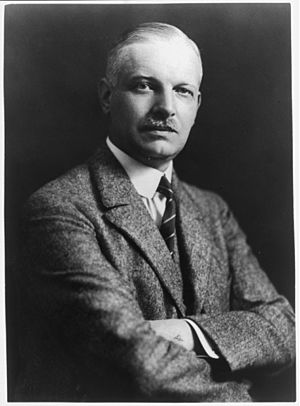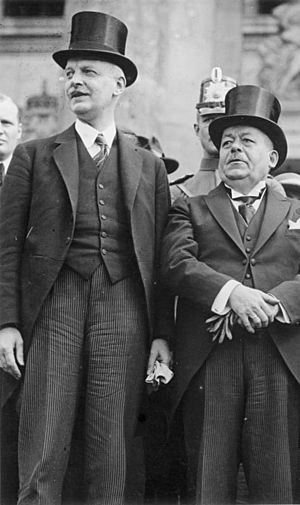Wilhelm Cuno facts for kids
Quick facts for kids
Wilhelm Cuno
|
|
|---|---|
 |
|
| Chancellor of Germany (Weimar Republic) |
|
| In office 22 November 1922 – 12 August 1923 |
|
| President | Friedrich Ebert |
| Preceded by | Joseph Wirth |
| Succeeded by | Gustav Stresemann |
| Personal details | |
| Born |
Wilhelm Carl Josef Cuno
2 July 1876 Suhl, German Empire |
| Died | 3 January 1933 (aged 56) Aumühle, Weimar Republic |
| Political party | None |
| Spouse | Martha Berta Wirtz |
| Children | 3 |
Wilhelm Cuno was an important German businessman and politician. He served as the Chancellor of Germany from 1922 to 1923. This was a very challenging time for Germany. During his time as Chancellor, French and Belgian troops occupied the Ruhr region. Germany also faced very high inflation, which means money quickly lost its value. Before becoming Chancellor, Cuno was the head of a big shipping company called Hapag.
Contents
Early Life and Education
Wilhelm Carl Josef Cuno was born on July 2, 1876. His birthplace was Suhl, a town in what is now Thuringia, Germany. His parents were August George Wilhelm Cuno and Catherina Elisabeth Theresia.
In 1906, Cuno married Martha Berta Wirtz. They had three sons and two daughters together.
Cuno studied law at universities in Berlin and Heidelberg. He earned a special degree called a Juris Doctor. This degree shows he had a deep understanding of law.
Early Career in Government and Business
Cuno started working for the German government in 1907. He worked in the Reichsschatzamt, which was like the Treasury Department. His job was to help prepare new laws. He would then present these laws to the Reichstag, which was the German parliament.
During World War I, Cuno helped organize food supplies for the German army. He worked in departments that managed food for the country during the war.
In 1917, Cuno left his government job. He joined a large shipping company called Hapag. He became a director there. After the head of Hapag passed away in 1918, Cuno became the company's general director. This meant he was in charge of the entire company.
As an expert in economics, Cuno took part in important international meetings. These meetings were about ending the war and dealing with payments Germany had to make. He also helped German shipping companies get paid for their ships that were given to other countries after the war.
In 1920, Cuno helped Hapag form a partnership with an American shipping company. This helped Hapag become a major passenger shipping line again.
Becoming Chancellor

Cuno was asked several times to become a government minister. He turned down offers to be foreign minister or finance minister. However, he agreed to become the Chancellor of Germany. He became Chancellor on November 22, 1922.
He was chosen by the German President, Friedrich Ebert. Cuno was the first Chancellor in the Weimar Republic who was not a member of a political party. He formed a government with experts and members from different parties. This government was seen as a group of skilled individuals rather than a typical political team.
People hoped that Cuno's government could solve Germany's problems. They especially wanted him to fix the issue of war payments and stabilize the German currency. However, his plans were rejected by other countries.
Germany fell behind on its payments of wood and coal. Because of this, France and Belgium sent troops to occupy the Ruhr region in January 1923. The Ruhr was Germany's industrial heartland.
Cuno's government responded by calling for "passive resistance." This meant that Germans in the Ruhr stopped working for the occupying forces. They also stopped sending goods to France and Belgium. The German government supported these people financially. This led to a huge increase in inflation, and the German currency quickly lost almost all its value.
Attempts to talk about the payments failed because France refused to negotiate. A wave of strikes against the German government began in August 1923. On August 12, 1923, Cuno and his government resigned. This happened after a vote of no-confidence from the Social Democratic Party.
Later Life
After leaving politics, Cuno returned to work at Hapag. In 1926, he became its general director again. He helped negotiate the return of German property that was held in the U.S. after the war. He also worked on combining Hapag with another large shipping company, Norddeutsche Lloyd, which happened in 1930.
In 1925, Cuno supported Paul von Hindenburg in the election for German President.
Wilhelm Cuno passed away on January 3, 1933, near Hamburg.
See also
In Spanish: Wilhelm Cuno para niños
 | Sharif Bey |
 | Hale Woodruff |
 | Richmond Barthé |
 | Purvis Young |

